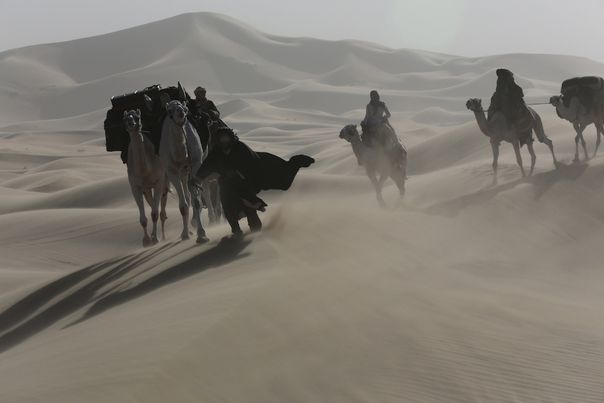Herzog in Love
By Alonso Díaz de la Vega
The idealism in Werner Herzog’s directing in Berlinale Competition film QUEEN OF THE DESERT (USA, Morocco) suggests something beyond its director’s lifelong identification with his main characters: his infatuation with this one.

Herzog has shown in the past a narcissistic romanticism when contemplating megalomaniacs like himself. From the optimistic Fitzcarraldo to the tragic Lope de Aguirre and Bruno Stroszek, dreamers and adventurers have populated Herzog’s consciousness almost to the point of archetypal possession. Yet these men were rarely portrayed to appear as flawless as real life explorer, writer, and spy Gertrude Bell (Nicole Kidman) is in QUEEN OF THE DESERT.
A rebel facing the early 20th century British patriarchy, Herzog’s heroine is a female chevalier, her stature stressed by Klaus Badelt’s overly decorative musical cues, which betray the formal sobriety of Herzog’s early films. The orchestral arrangements he employs here transform the actions of the characters from brave to grand, so Bell is seen by Herzog and her fellow explorers as a towering image of audacity and virtue – she’s even more dignified than the film’s clumsy Winston Churchill. We might assume, then, that at least one of the men who love her is the director’s onscreen surrogate.
According to legend, Herzog pretended to be a veterinarian in order to steal the monkeys that appear at the end of AGUIRRE, THE WRATH OF GOD (Aguirre, der Zorn Gottes, West Germany). Charles Doughty-Wylie (Damian Lewis), one of Bell’s lovers, claims to have done the same to kidnap a horse he offers Gertrude as a romantic gesture. This reveals Herzog’s idea of Bell: the film’s romantic tone makes us wonder about that similarity between the director and Doughty-Wylie and also explains its simplistic approach towards its morally perfect protagonist.
The images of the barren desert underscore Bell’s romantic misfortunes and, along with her underdeveloped character, make her seem more pathetic. Herzog approaches her with the grief a lover feels when impotently watching his other half in pain.

